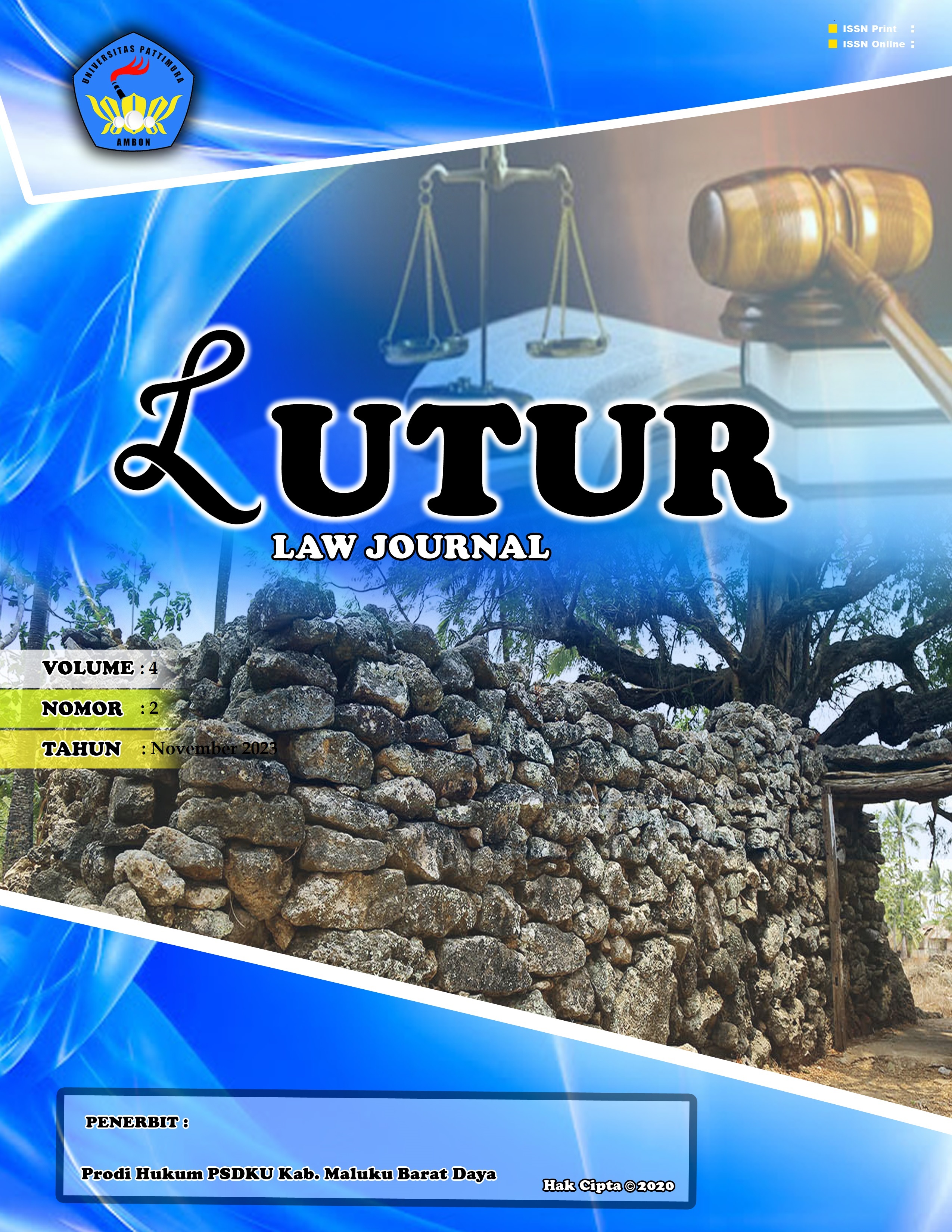Kepemilikan Tanah Eks Eigendom Verponding 1065 Yang Ada Di Negeri Tawiri
Abstract
Introduction: Land is a very important thing in Customary Law (can be referred to as Customary Land Law). The relationship between humans and land is closely related, namely land as a place for humans to live and continue their lives. Customary land is the property of customary law communities that have been controlled for a long time. Customary land law, known as land rights in Indonesia, such as ulayat lands, private lands, business lands, Gogolan lands, bengkok lands, agrarisch eigendom lands, and others.
Purposes of the Research: This writing aims to find out the relationship between humans and the soil is very related to the land as a place for humans to live and continue their lives. While eigendom is a right of ownership to a land asset that existed during the Dutch colonial era that is subject to the provisions of Western land law in force for eigendom rights, then with the promulgation of the UUPA, the unification of Indonesian land law with the former Western rights that have not been converted to land rights as stipulated in the UUPA.
Methods of the Research: legal writing that is juridical normative approach
Results / Findings / Novelty of the Research: that the arrangement of compensation for the right of ownership of the Land of the former Eigendom Verponding 1065 that has not been converted is still possible to obtain proof of ownership, but not through conversion again but through granting new rights to the Office of the National Land Agency (BPN) with a certificate of ownership issued by the village head of the local area. Procedures and stages of land registration carried out by BPN Ambon on former Land objects eigendom 1065 the process of land rights derived from western rights including eigendom verponding to obtain legal certainty, by implementing the provisions of PP No.24 of 1997 consistently, well and truly will be about the right to land eigendom verponding, which ensures legal protection for holders of rights to the land of the former eigendom verponding. then the bookkeeping is simply done by giving a stamp/stamp on the evidence by writing the type of rights and rights number converted, which is regulated in PP Regulation No.24 of 1997 on land registration
Downloads
References
Artikel Jurnal
William Seven Liadi, “Kedudukan Eigendom Verponding dalam Hukum Pertanahan di Indonesia” Jurnal Panorama Hukum 4, No. 1, 2019.
Buku
A P. Parlindungan, Pendaftaran Tanah di Indonesia, Mandar Maju, Bandung 1990.
Arie Hutagalung ddk, “Asas-asas hukum Agraria”. Buku Ajar Mata Kuliah Hukum Agraria, Depok, 2012.
Diyan Isnaeni dan Suratman, Reforma Agraria Land Reform dan Redistribusi Tanah di Indonesia. Malang: Intrans Publishing, 2018. 149.
Harsono, Boedi. Hukum Agraria Indonesia Sejarah Pembentukan Undang-Undang Pokok
Agraria, Isi dan Pelaksanaannya. Jakarta 2003: Djambatan.
Julius Sembiring, Tanah Negara Edisi Revisi, Jakarta, Kencana 2016.
Lubis, M. Y., & Lubis, A. R.. Hukum Pendaftaran Tanah. 2008,
Lubis, M. Y., & Lubis, A. R.. Hukum Pendaftaran Tanah. 2008.
Parlindungan, A. P.. Konversi Hak-Hak Atas Tanah, 1990.
Peter Mahmud Marzuki, Penelitian Hukum, Jakarta: Kencana Prenada Media Group, 2011.
Soetojo, M. Undang-Undang Pokok Agraria dalam pelaksanaan landreform, 1961.
Sudargo Gautama, Masalah Agraria, Bandung: Alumni, 1973.
Copyright (c) 2023 Rizal Riski Kailul, Adonia Ivonne Laturette, Novyta Uktolseja (Author)

This work is licensed under a Creative Commons Attribution-NonCommercial 4.0 International License.
Authors who publish their manuscripts in this Journal agree to the following conditions:
- The copyright in each article belongs to the author, as well as the right to patent.
- Authors are able to enter into separate, additional contractual arrangements for the non-exclusive distribution of the journal's published version of the work (e.g., post it to an institutional repository or publish it in a book), with an acknowledgment of its initial publication in this journal.
- Authors are permitted and encouraged to post their work online (e.g., in institutional repositories or on their website) prior to and during the submission process, as it can lead to productive exchanges, as well as earlier and greater citation of published work.
- Authors have the right to self-archiving of the article (Author Self-Archiving Policy)














